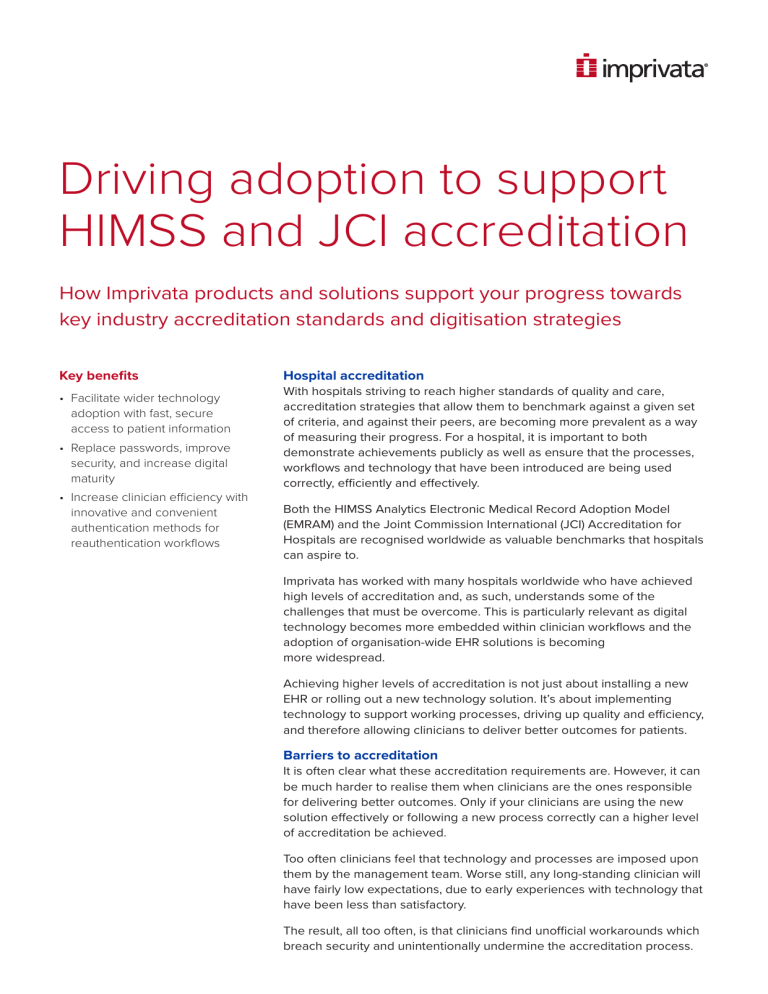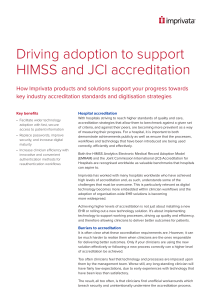
Driving adoption to support HIMSS and JCI accreditation How Imprivata products and solutions support your progress towards key industry accreditation standards and digitisation strategies Key benefits • Facilitate wider technology adoption with fast, secure access to patient information • Replace passwords, improve security, and increase digital maturity • Increase clinician efficiency with innovative and convenient authentication methods for reauthentication workflows Hospital accreditation With hospitals striving to reach higher standards of quality and care, accreditation strategies that allow them to benchmark against a given set of criteria, and against their peers, are becoming more prevalent as a way of measuring their progress. For a hospital, it is important to both demonstrate achievements publicly as well as ensure that the processes, workflows and technology that have been introduced are being used correctly, efficiently and effectively. Both the HIMSS Analytics Electronic Medical Record Adoption Model (EMRAM) and the Joint Commission International (JCI) Accreditation for Hospitals are recognised worldwide as valuable benchmarks that hospitals can aspire to. Imprivata has worked with many hospitals worldwide who have achieved high levels of accreditation and, as such, understands some of the challenges that must be overcome. This is particularly relevant as digital technology becomes more embedded within clinician workflows and the adoption of organisation-wide EHR solutions is becoming more widespread. Achieving higher levels of accreditation is not just about installing a new EHR or rolling out a new technology solution. It’s about implementing technology to support working processes, driving up quality and efficiency, and therefore allowing clinicians to deliver better outcomes for patients. Barriers to accreditation It is often clear what these accreditation requirements are. However, it can be much harder to realise them when clinicians are the ones responsible for delivering better outcomes. Only if your clinicians are using the new solution effectively or following a new process correctly can a higher level of accreditation be achieved. Too often clinicians feel that technology and processes are imposed upon them by the management team. Worse still, any long-standing clinician will have fairly low expectations, due to early experiences with technology that have been less than satisfactory. The result, all too often, is that clinicians find unofficial workarounds which breach security and unintentionally undermine the accreditation process. The solutions offered by Imprivata are designed to support organisations in driving adoption of their EHR or technology investment and facilitating more efficient, higher quality, and more secure workflows within the hospital. Overcoming the barriers The solutions offered by Imprivata are designed to support organisations in driving adoption of their EHR or technology investment and facilitating more efficient, higher quality, and more secure workflows within the hospital. Imprivata has been involved in over 1,700 implementations globally, working with hospitals who have implemented a variety of EHR systems and other technology solutions. This experience has allowed Imprivata to develop and document best practice approaches that can be shared to help projects get faster and stronger adoption. How Imprivata supports accreditation HIMSS EMRAM Imprivata solutions support organisations in achieving the HIMSS EMRAM stages. When looking at the various EMRAM stages, each increase in stage adds further requirements for technology usage within clinician workflows, eventually moving to paper-free at Stage 7. In addition, following the revisions made in 2017 (introduced 1st January 2018), security plays a bigger part as a recognition of the critical nature of hospitals. Supports security protocols As an example of the new security requirements, Stage 2 now requires: “Basic security policies and capabilities addressing physical access, acceptable use, mobile security, encryption, antivirus/anti-malware, and data destruction.” Imprivata OneSign® can support organisations in addressing the challenges of security by providing a secure tap-and-go solution that enables clinicians to spend less time with technology and more time with patients. By allowing clinicians to quickly and securely access clinical and administrative applications, and streamlining clinical workflows, Imprivata OneSign eliminates the need for clinicians to adopt insecure working practices, thus, driving EHR adoption in line with EMRAM requirements. Supports CPOE workflows At higher levels, more complicated workflows are introduced such as Computerized Practitioner Order Entry (CPOE). Where these workflows require a witness to confirm, Imprivata Confirm ID® can support that process by allowing clinicians to use a variety of methods to carry out the signing that do not require the retyping of a username and password. Key to increasing a hospital’s EMRAM stage is the adoption of the various systems in use, both software and hardware is increased across the hospital with more clinicians using them across a wider range of workflows. For example, at Stage 4, the requirement is 50% of orders placed using CPOE and at Stage 7 it is 90%. The key to achieving these higher levels is to make the technology as transparent as possible, allowing the process to become seamless, therefore driving a higher level of adoption. If products and solutions that support the seamless process of adoption are introduced earlier in the project, the transition to higher EMRAM levels can be made significantly easier and allow a wider range of technology and associated processes to be rolled out sooner. Imprivata products and solutions are well placed to facilitate this and ensure technology becomes transparent to users and just another tool to support them caring for patients. Joint Commission International The JCI Accreditation Standard is focused on the wider processes implemented within the hospital and therefore has less focus on technology than HIMSS EMRAM. Whilst it may relate to broader themes within the hospital, there are still a number of requirements that do relate to technology implementations and workflows that inevitably require technology to support. Specifically, Imprivata solutions support the following requirements: Reference Requirement Imprivata solution MMU.6.1 The requirement of a process to verify the medication is correct based on prescription or order Imprivata Confirm ID for Clinical Workflows provides re-authentication workflows allowing clinicians to approve medication request prior to them being issued. MOI.2 Information privacy, confidentiality and security are maintained Imprivata OneSign provides transparent, seamless, and convenient security into clinical workflows that streamline the clinicians’ experience. MOI.7 Records and information are protected from loss, destruction, tampering and unauthorized access or use Imprivata OneSign protects patient data by preventing credential sharing, securing patient data on unattended workstations. MOI.11 The hospital identifies those authorised to make entries in the patient clinical record Imprivata OneSign enables more thorough auditing and easier reporting of workstation and application access. As with HIMSS EMRAM, adoption is key to achieving these standards. Only by ensuring that clinicians are able to adhere to a process in a way that does not act as a barrier to their actual role will the process and/or technology solution provide a positive benefit to the hospital and its patients. Conclusion The solutions offered by Imprivata are designed to support hospitals in delivering new technology and clinical workflows that require technology solutions. Imprivata OneSign offers a single sign-on (SSO) and tap-and-go solution that enables clinicians to spend less time with technology and more time with patients. Imprivata Confirm ID supports the numerous workflows that require reauthentication or witness signing. Together, these solutions enable hospitals to maximise their wider technology investment and work towards higher levels of attainment within their chosen accreditation path. The solutions offered by Imprivata are designed to support hospitals in delivering new technology and clinical workflows that require technology solutions. About Imprivata Imprivata, the healthcare IT security company, enables healthcare securely by establishing trust between people, technology, and information to address critical compliance and security challenges while improving productivity and the patient experience. For further information please contact us at: 1 781 674 2700 or visit us online at www.imprivata.com/intl Offices in: Lexington, MA, USA Uxbridge, UK Melbourne, Australia Nuremburg, Germany The Hague, Netherlands Copyright © 2018 Imprivata, Inc. All rights reserved. Imprivata, OneSign, and Confirm ID are registered trademarks of Imprivata, Inc. in the U.S. and other countries. All other trademarks are the property of their respective owners. DS-HIMSS-JCI-MidEast-0618

